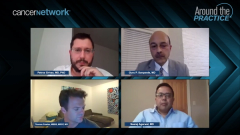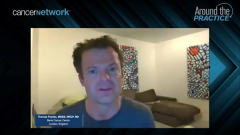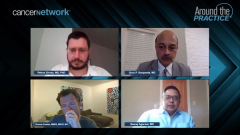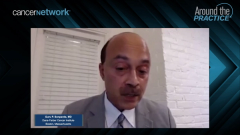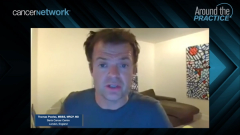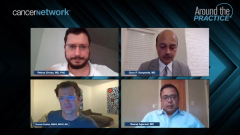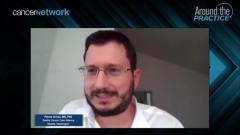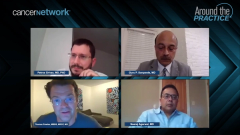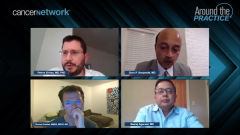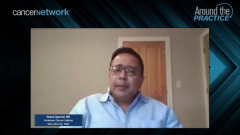
Metastases and Variant Histology in Urothelial Cancer
Thomas Powles, MBBS, MRCP, MD, leads the discussion on selecting chemotherapy vs immune checkpoint inhibitors in the adjuvant setting for a patient who has metastases in urothelial carcinoma as well as approaching therapy for variant histology.
Episodes in this series

Petros Grivas, MD, PhD: One colleague asked, “Does the area of metastasis, especially a sensitive area that may have a response, influence your decision on the up-front setting of chemotherapy followed by avelumab or a checkpoint inhibitor?” Even if there’s a response right away, someone could think about chemotherapy and give you a higher chance of response. This may be a decision factor. Any comments on that? Tom?
Thomas Powles, MBBS, MRCP, MD: We haven’t focused much on the site of metastasis. Speaking frankly, this is relevant. When I see a patient with liver and bone metastasis, we know those cancers are going to grow fast and are going to be problematic. The first thing with that sort of patient is not about treatment choice. Treatment choice is relevant, but if you’re going to treat, you’re going to have to get on with it. The patient wants to go on a holiday for a month, the answer is definitely no. That’s not the case. In kidney cancer, we surveillance of lots of patients. For lymph node–positive disease, I would lead a year post-cystectomy after no treatment with 2 lymph nodes 1.5, 1.4 cm. It’s aggressive.
There’s an issue around the aggressive nature of the tumor. As you know, brain metastases are relatively rare, which is 1 of the graces of bladder cancer. Unlike some of the other cancers, we don’t have to deal with that often because that does complicate treatment. The role of multimodality therapy for bone metastasis is quite frequent, and you might say that for locally recurrent disease, giving radiation therapy might be relevant. But the site of metastasis has more to do with choice of treatment, about what to do with prognosis and what’s going to happen in the future.
Petros Grivas, MD, PhD: Thank you, Tom. Neeraj and Guru, any comments on that?
Neeraj Agarwal, MD: I wouldn’t say anything different from what Tom said. Thank you.
Guru P. Sonpavde, MD: If anything, if someone has visceral disease and lower metastases, I might want to lean more toward the JAVELIN Bladder 100 paradigm than a first line immune checkpoint inhibitor because progression disease as the best response rate is higher with an immune checkpoint inhibitor, Really, an initial control would be better in a patient like that.
Petros Grivas, MD, PhD: Wonderful. The last question, I promise: What about viral histologists? Would you do anything different in someone who has viral histology? Let’s say predominant, nonurothelial cancer? Would you treat it the same way? It’s an unmet need. I’ll go with Tom and then Neeraj and Guru.
Thomas Powles, MBBS, MRCP, MD: It’s a complicated question. How do we define it? If it’s a predominately urothelial base cancer, then we treat as urothelial cancer. If it’s predominantly squamous or it’s all small cell, then it’s more complicated. Do we know what do to? Squamous cancers, surgery, and chemotherapy is the standard of care. Immune checkpoint inhibitors haven’t been tested. There was a large study—Guru, you led this trial. The tocilizumab phase 4 trial with 1000 patients, looking at various histologies. There were some responders. We saw that, but I’ll let Guru talk about that. The plasmacytoid cancers are more aggressive. We need to be careful of those tumors, particularly in the T2 setting, about messing around. Those patients need to go and have surgery. It’s an area where we need to learn more about.
Petros Grivas, MD, PhD: Absolutely. We definitely need to learn more. Guru, you can go next and Neeraj at the end.
Guru P. Sonpavde, MD: General trials of urothelial carcinoma have included pure urothelial or predominantly urothelial, loosely defined as more than 50% of the tumor in histology showing a urothelial component. But if there’s a sharp cutoff, then we shouldn’t be applying these regimens to patients who are predominantly nonurothelial, that adeno-squamous component. In fact, in the data that we looked at, regardless of the component of urothelial cancer, there wasn’t a big analysis, so there’s not a striking difference between mixed urothelial and pure urothelial cancer. It needs to be teased out. But the pure adeno, the pure squamous, the pure variant type are where we have more uncertainty. We don’t have good data on how active these variants are. Tom referred to the STRONG trial, which was not atezolizumab but nivolumab. That trial gave nivolumab to patients after platinum, even pure variant and mixed histology. There was some activity, but overall it seemed somewhat less numerically comparable with the urothelial predominant urothelial.
Petros Grivas, MD, PhD: Thanks, Guru. Neeraj, any comments on this before we make some final comments?
Neeraj Agarwal, MD: The only additional comment—it’s already been said—is that I like to sequence and obtain comprehensive genomic profiling for these patients with variant histology at the first chance I get. I try to get them on a clinical trial.
Petros Grivas, MD, PhD: Thank you, Neeraj. Great points, guys. I’ll make a couple of comments before we close. People were asking about challenges and unmet needs. We definitely want to see more patients cured. Why not in the future be able to cure urothelial cancers and unmet needs? We have many challenges. We talked about attrition as we go across lines of therapy. We want to keep more patients on treatment alive and progression-free. There are many approaches. We talked about biomarkers. For antibody-drug conjugates, you have 2 approved: enfortumab vedotin and... For targeted therapies, we have erdafitinib approved in FGFR2 and FGFR3 genetic mutations. Hopefully with combination therapies in the future we may have more responses and more progression-free and longer survival intervals.
With that, I’d like to thank Dr Sonpavde,Dr Powles, and Dr Agarwal for joining us. It’s very late in London, England, so thanks for staying late. Also, I’d like to remind you of the ESMO [European Society for Medical Oncology] elections, which are going on at this time. Thank you, Neeraj, for joining us. It’s always a pleasure to discuss with all 3 of you. This very lively discussion on advanced urothelial carcinoma has been brought to you by the CancerNetwork®. Thank you to the audience. I hope you found this interactive discussion very informative and beneficial to your clinical practice. I found it to be beneficial and helpful for me. One more time, thank you, Tom. Thank you, Guru. Thank you, Neeraj.
Guru P. Sonpavde, MD: Thank you.
Neeraj Agarwal, MD: Thank you very much.
Thomas Powles, MBBS, MRCP, MD: Thank you very much.
Transcript edited for clarity.
Newsletter
Stay up to date on recent advances in the multidisciplinary approach to cancer.


